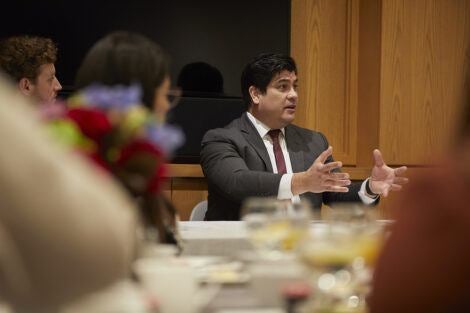October 17, 2022 – The U.S. has a lot to learn from Costa Rica.
That message came through loud and clear in a fireside chat with former Costa Rican President Carlos Alvarado Quesada, held October 13 at Harvard T.H. Chan School of Public Health.
Alvarado took office in 2018 at the age of 38 and stepped down last May, at the end of his constitutionally limited term. He is currently serving as a professor of practice at Tufts University’s Fletcher School of Law and Diplomacy.
Alvarado guided Costa Rica through the COVID-19 pandemic, which the country was able to weather well due to its strong universal healthcare system and extensive network of primary health care clinics and vaccination sites. Alvarado also made climate change a top priority, launching a National Decarbonization Plan with the goal of achieving net zero emissions nationwide by 2050.
“Costa Rica is an example of how a small country can succeed in tackling great challenges—and become a global model,” Dean Michelle Williams said as she introduced Alvarado to a small group of faculty and students for the fireside chat.
Speaking at the event with student Cornelius Rau, who is working toward a master of science in epidemiology, Alvarado acknowledged that politics tends to reward big, flashy announcements and investments over the quiet and painstaking work of investing in public health.
“The best actions you can take in public health are not necessarily correlated with a lot of spending. They’re simple things like reminding people about hand washing, vaccination, and how not to let standing water accumulate” to avoid attracting the mosquitoes that spread dengue, he said. “For a politician, it might be better to inaugurate a big fancy hospital.”
To keep his focus on proactive investments with long-term dividends, Alvarado said he often reminded himself of a Chinese proverb: “The best time to plant a tree was 20 years ago.” He considers investments in public health the equivalent of planting seedlings across Costa Rica. “In 20 years, maybe someone will say ‘Well done!’” he said, drawing laughter from the room.
In fact, as Williams noted in her introduction, Costa Rica’s investment in public health began in earnest in the 1970s with a concerted effort to design a system that prioritized primary and preventive care. The government created dedicated public health teams in every community and built high-quality clinics even in the most remote rural regions. Successive campaigns focused on critical issues including maternal mortality, nutrition, sanitation, and vaccinations. “It has been an astounding success,” Williams said.
Today, life expectancy in Costa Rica approaches 81 years. In the U.S., by contrast, it’s at 76 after dropping sharply the last two years.
“We have a lot to learn from Costa Rica when it comes to health care policy and management,” Williams said.
Alvarado stressed the importance of recognizing health—and health care access—as a “basic right.”
He also talked at length about the critical need to transition away from fossil fuels to tackle climate change. “All of us have heard that there’s a tradeoff between climate and growth,” he said. “That’s a dogma. It means the only way society can grow, thrive, and prosper is through fossil fuels. [If that’s true], we’re already doomed.”
Alvarado called on public health faculty and students to challenge that conventional wisdom and communicate the economic as well as the health and environmental benefits of investing in renewable energies. “Transforming your whole society [through decarbonization] — isn’t that one of the greatest business opportunities there is?” he asked.
Asked to share some advice with Harvard Chan students, Alvarado urged them to identify their passion and make that their guiding star. “You need to [follow] that with all your courage,” he said. “Change is possible. If a small country like Costa Rica can do these things … you can make good change happen, too.”
photo: Kent Dayton
